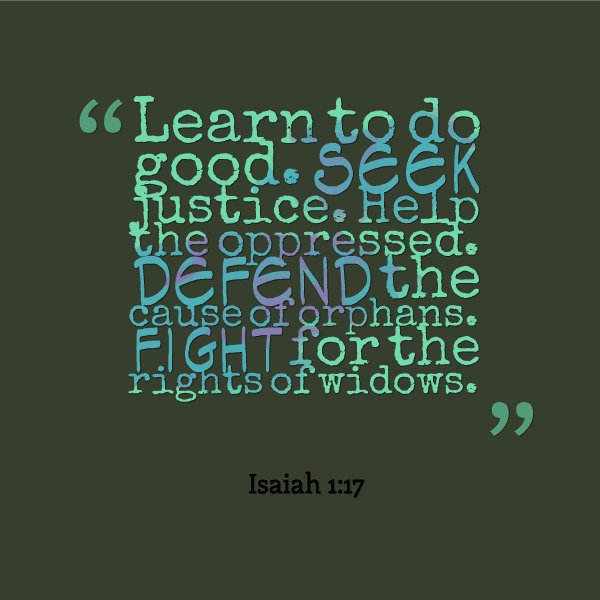 START WITH SCRIPTURE:
START WITH SCRIPTURE:
Isaiah 1:1, 10-20
CLICK HERE TO READ SCRIPTURE ON BIBLEGATEWAY.COM
OBSERVE:
Isaiah is one of the most prominent prophets in the Old Testament. The book of Isaiah is sometimes called the “Fifth Gospel” because it is quoted more frequently in the New Testament than any other Old Testament book.
Isaiah’s years of active prophetic ministry stretch from the death of King Uzziah, around 740 B.C., to the reign of Hezekiah, which ended in 687 B.C.
There is evidence that Isaiah was related through his father Amoz to the royal house of Judah, which would explain his residence in Jerusalem and his proximity to the court.
However, if any such relationship existed, it didn’t prevent Isaiah from speaking forthrightly to the kings about issues of social justice and injustice, and God’s judgment.
In today’s lectionary Scripture selection, he is taking the current administration to task, and he doesn’t pull any punches. He demands that they listen to the word of the Lord, and calls them rulers of Sodom and people of Gomorrah!
This reference to the two cities destroyed in the time of Abraham and Lot is serious. The sexual sins and cruel inhospitality of their citizens were punished with “extreme prejudice” — they were totally annihilated (Genesis 19). Only Lot and his two daughters were spared.
What is the nature of Judah’s crimes? God is fed up with their insincere worship, sacrifices, festivals, Sabbaths, and empty prayers:
I will not listen;
your hands are full of blood.
Instead, he calls upon them to purify themselves not merely by washing, but by reforming their actions:
cease to do evil,
learn to do good;
seek justice,
rescue the oppressed,
defend the orphan,
plead for the widow.
Ritual worship without moral reform and social justice for the oppressed and the most vulnerable among them is futile.
Nevertheless, God is eager for Judah to encounter him and to work through what it means to truly belong to him. The language that he uses is like that of a judicial court proceeding:
Come now, let us argue it out,
says the Lord:
However, there is the clear offer of mercy even for a people compared to Sodom and Gomorrah:
though your sins are like scarlet,
they shall be like snow;
though they are red like crimson,
they shall become like wool.
Isaiah has already accused them of having their hands bathed in the blood of their victims — this is why their sins are scarlet and crimson. Still, God’s grace is able to wash away the bloodstains of sin.
Isaiah offers them two choices — blessing or curse:
If you are willing and obedient,
you shall eat the good of the land;
but if you refuse and rebel,
you shall be devoured by the sword;
for the mouth of the Lord has spoken.
This was no idle threat. In Isaiah’s time, the Northern Kingdom of Israel was already experiencing the beginning of judgment at the hand of Imperial Assyria. Eventually, Israel was conquered in 721 B.C. And by 700 B.C., the Assyrians invaded the Southern Kingdom of Judah and even besieged Jerusalem. Although the Assyrians did not destroy Judah, they were a constant threat.
APPLY:
One of the constant refrains from the prophets and the Psalmists is that worship without justice and sincerity is empty. The height of hypocrisy is to worship on the Sabbath and then oppress the poor, cheat others in the marketplace, and engage in sin of any kind.
The goal of worship is not merely ritual righteousness, but right relationship with God. And right relationship with God must be grounded in true holiness of heart and life.
God’s appeal to us is transformative. The NRSV translation suggests God wants to argue with us, as though we are in court. Older translations, like the RSV, offer a gentler perspective:
Come now, let us reason together,
says the Lord (Isaiah 1:18).
The implication is that it is not the blood sacrifices of the temple that will wash away the scarlet sins that stain our hands, but a God who wishes to penetrate our very hearts and minds with his lovingkindness.
RESPOND:
I am an amateur student of the American Civil War. I have ancestors who fought and shed blood for the Confederacy. I understand the importance of not judging the choices of one’s ancestors by modern standards.
However, as Abraham Lincoln once said:
If slavery is not wrong, then nothing is wrong.
In my opinion, the injustice and oppression of slavery received its due penalty in the bloodbath of a terrible war. The “Original Sin” of our Founding Fathers was expiated in blood. Isaiah might have said to them:
…if you refuse and rebel,
you shall be devoured by the sword;
for the mouth of the Lord has spoken.
In the times in which we live, when racial tensions and inequality still exist, we must also hear the Lord say to us:
Come now, let us reason together,
says the Lord (Isaiah 1:18).
Lord, may my worship and my works be in harmony. Amen.
PHOTOS:
“Isaiah 1:17” by Lisa Hall-Wilson is licensed under a Creative Commons Attribution-NonCommercial 2.0 Generic license.